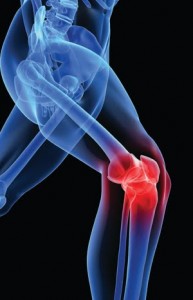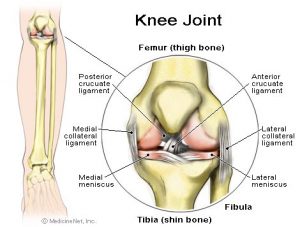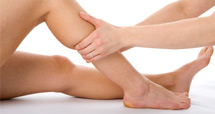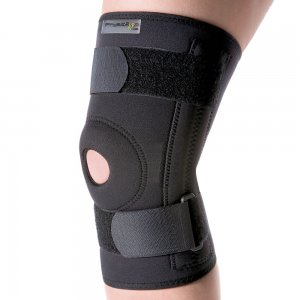What to do if you have injured your Knee (Acute Knee Injuries)
Words by Experienced Physio & previous Carlton & GC Suns AFL Physio, Mark Homewood
 Traumatic injuries involving the knee joint can occur during sports and leisure activities, an accident at work or just going about your daily life.
Traumatic injuries involving the knee joint can occur during sports and leisure activities, an accident at work or just going about your daily life.
The knee joint, or tibiofemoral joint, is stabilised by a wonderful system of cruciate ligaments (ligaments join bone to bone and these cruciate ligaments control forwards and backwards sliding of the joint), & the  collateral ligaments (these control side to side motion of the joint) that work together to passively control forces acting on the knee joint during movement.
collateral ligaments (these control side to side motion of the joint) that work together to passively control forces acting on the knee joint during movement.
Shock absorption within the knee joint is provided by the medial and lateral meniscus, two discs of fibrocartilage that are attached to the top of the tibia and help to protect the articular surfaces of the joint by dissipating and absorbing impact forces during running, jumping or walking.
 Trauma to the knee joint involving twisting forces or forces that open the medial (inside) or lateral (outside) side of the joint can damage the stabilizing ligaments of the knee. The injury most commonly associated with knee trauma is rupture of the anterior cruciate ligament (ACL).
Trauma to the knee joint involving twisting forces or forces that open the medial (inside) or lateral (outside) side of the joint can damage the stabilizing ligaments of the knee. The injury most commonly associated with knee trauma is rupture of the anterior cruciate ligament (ACL).
The mechanism of ACL injury usually involves landing or cutting movements where the knee drops inwards and rotates inwards over a planted foot. Injury to the ACL is usually associated with extensive damage to the knee joint surface, tearing of the medial collateral ligament (MCL) and meniscal damage.
Other common knee trauma injuries involve isolated injury to the collateral ligaments, rupture or stretching of the posterior cruciate ligament (PCL), acute meniscal tears or damage to the articular surfaces of the joint due to forceful impact between the tibia and femur.
Signs and Symptoms of an Acute Knee Injury
Acute knee injuries commonly involve:
- a clearly defined mechanism of injury, with possible feelings of “popping” or giving away preceding pain and incapacity.
- there will often be extensive swelling within the knee joint. This swelling may appear almost immediately or slowly over a period of 12 to 24 hours depending on the structures injured.
- weightbearing may be limited due to pain and instability.
Diagnosis

Using a combination of extensive questioning about the mechanism of injury, objective orthopaedic tests and clinical reasoning, your physiotherapist will be able to help diagnose the knee structures that have been injured.
Diagnosis may also involve referral for diagnostic imaging, most commonly an MRI, to help confirm the exact extent of damage and/or referral to an Orthopeadic Specialist.
Management
 Management of your acute knee injury is dependent on which structures have been injured. Extensive damage to the joint, such as an ACL rupture or complex meniscal injury will usually require consultation with an orthopaedic surgeon to ensure appropriate management, which may involve surgery (although it is very possible to lead a normal life without these ligament structures repaired).
Management of your acute knee injury is dependent on which structures have been injured. Extensive damage to the joint, such as an ACL rupture or complex meniscal injury will usually require consultation with an orthopaedic surgeon to ensure appropriate management, which may involve surgery (although it is very possible to lead a normal life without these ligament structures repaired).
Less severe injuries can be managed with a period of bracing or taping to help protect the injured structures and allow time for adequate healing, and occasionally crutches are also needed for a short period.
During the early phase of recovery, it is crucial to gain control of knee joint swelling to help prevent excessive quadriceps muscle wasting and poor joint function. At Gold Coast Physio & Sports Health we have ice/compression units that can be used to assist controlling the swelling and pain, and we sell braces & crutches to help your management. Your Physio will help guide you on the best options.
Once pain and swelling are controlled, your physiotherapist will work with you to help prescribe lower limb strength and range of motion exercises to help you and your knee to return to peak performance. This may involve basic, through to advanced exercises for both your knee and your whole leg. We have a rehab gym space available to allow us to help you return to full function- whether that be for daily living, work, exercise or sport.
If you experience an acute knee injury and would like an accurate diagnosis and a comprehensive plan to manage and rehabilitate the injury , make sure you come and see one of our experienced Physio’s at Gold Coast Physio & Sports Health. Book Online or phone us on 07 55006470.
